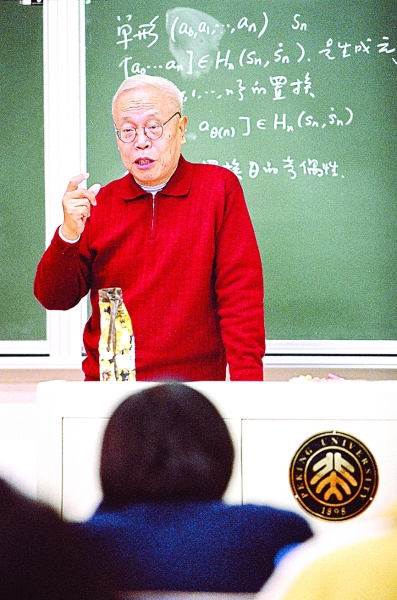Peking University, Oct. 18, 2010: With black-rimmed spectacles and a kind smiling face, and silver-haired, Prof. Jiang Boju looks sedate and intellectual. He is a professor of Peking University School of Mathematical Sciences (SMS), and a winner of the first "National Model for Teaching and Educating."

Prof. Jiang teaching in class.
Born in 1937 in a family in Tianjin with a math tradition, Prof. Jiang Boju is closely related with math all his life. Aged only 16, he matriculated at PKU and was tutored by famous mathematician Jiang Zehan (1902-1994). He created a few admirable math methods when he was young. Now, in his seventies, as a world-famous topology expert, he still stresses that educating is his primary duty and lifelong love.
"Never too Old to Learn"
In 1953, Jiang Boju entered then Department of Mathematics and Mechanics of PKU with an excellent grade. He stood out among his contemporaries during his study in PKU. After graduating, he stayed at PKU as a teacher and became an assistant of Prof. Jiang Zehan during which period he gradually found his own research direction in fixed point theory and lower-dimensional topology, which other Chinese researchers at that time paid little attention to.
In 1964, Jiang effectively calculated the Nielsen numbers in one particular extensive scope by examining a sub-group in Fundamental Group. This discovery got immediate attention from the academic field of topology and thus Nielsen Fixed Point Theory was activated again. From then on, this sub-group has been named after his name. And he comprehensively verified the Nielsen Fixed Point Conjecture using theories and methods in Low-dimensional Topology in the 1980s, which achievement was widely acclaimed.
In 1983, the then 46-year-old Jiang became the youngest professor in PKU, and afterward won many great honors, including the first Dean of School of Mathematical Sciences, Member of Chinese Academy of Sciences, Memeber of The Third World Academy of Sciences, winner of Prize of National Natural Sciences, winner of Chen Xingshen Mathematical Prize and winner of Hua Luogeng Mathematical Prize. However, when others praise him as a master, Prof. Jiang Boju said modestly, “I’m not qualified to be a master. There is still a lot I should learn in doing academic research and being a better person.”
"Lessons Perfect"
"Prof. Jiang is one of the most popular professors among us. We enjoy his lessons very much. What moves us most is that he, as an academician with abundant research work to do, still persists in marking the students' homework himself," most of the interviewed undergraduate students said.
"Marking the papers himself is to find the common problems and to adjust his teaching manner accordingly." Prof. Jiang has a good and rigorous teaching style, which is praised by the students frequently. Some even described Prof. Jiang's lessons as perfect. He pays great attention to articulating every concept and raising thought-provoking questions.
On weekdays, there are always students coming to his office to ask questions. He often writes on the two blackboards in his office and has heated discussions with his students. He never hesitates to spend time in carefully selecting materials that reflect the latest thinking and research results. These materials are distributed to the graduate students for them to study on. With all those efforts, he hopes to speed up their pace of getting into the academic frontier.
He often says: "I am a teacher first, then a researcher." Mathematics Research and Personnel Training Bases, the work done by the School of Mathematical Sciences is rewarded as the Grand Prize of National Teaching Achievement. Since the 1970s, he has trained dozens of graduate student and doctoral students such as Wang Shicheng, Qian Haibao, and Zhou Qing. They have completed their study abroad and later achieved great success in the fields of teaching and research.
"The School of Mathematical Sciences is not only a place for training mathematicians."
In the 1960s and 1970s, Jiang taught lessons in factories and gave aid to the research conducted by the engineers. He felt a sense of embarrassment in China's mathematical field, finding that most engineers knew less maths than they should.
However, foreign engineers and scientists have a good understanding of maths. Those who receive mathematical training or graduate from the school of Mathematical Sciences have a cross development in other fields. Therefore, maths can provide genuine help for academic researches and technological innovations.
"The School of Mathematical Sciences is not only a place for training mathematicians." Professor Jiang sticks to the idea. "We must take the students' future whereabouts and personal development into consideration. The School of Mathematical Sciences must train numerous people who know mathematical science well which means that they can make contributions to various fields."
To reach the goal, he led 14 schools to participate in the project "Reform in Teaching Content and Curricular System of Majors in Mathematical Science in the 21st Century” conducted by the Ministry of Education. And he presided over the founding of School of Mathematical Sciences. Just before the 1997 Asian Financial Crisis, he led the establishment of the Department of Financial Mathematics in PKU.
Prof. Jiang also concerns about the mathematical teaching in primary and secondary schools. He advocates promoting the qualities of citizens through mathematical training. He thinks that the traditional culture and social customs focus on experience rather than theories. The maths education can burden the responsibility of enlightening rationality and scientific spirits. He regards the simplest things as the most essential and basic. This is just the logic and power of scientific spirit. "It is the base of having critical and independent thinking, The Mathematical training is the essential part in teaching children to discern things.
Since his enrollment in 1953, he has been in Peking University for 56 years. His diligent and attentive image has been engraved in students’ minds.
Translated by: Xu Xinyi and Chen Wei
Edited by: Zhang Chunlan
Source: Guangming Daily